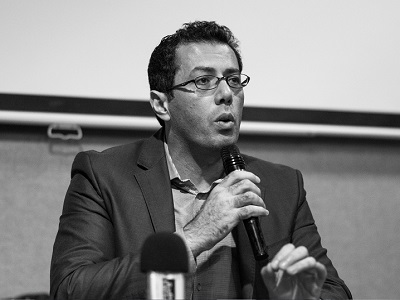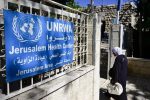When Google Earth was launched in 2001 I rushed immediately to locate a village that no longer exists on a map which now delineates a whole different reality. Although I was born and raised in a Gaza refugee camp and then moved to and lived in the United States finding a village that was erased from the map decades earlier was not at least for me an irrational act. The village of Beit Daras was the single most important piece of earth that truly mattered to me.
However I could only estimate exactly where it had once stood. Beit Daras was located 32 kilometres north-east of Gaza on elevated ground perched gently between a large hill and a small river that seemed never to run dry.
A once peaceful village Beit Daras had existed for millennia. Romans Crusaders Mamluks and Ottomans ruled over and even tried to subdue Beit Daras as with all of Palestine yet they failed. True each invader left their mark – ancient Roman tunnels a Crusaders’ castle a Mamluk mail building an Ottoman khan (Caravanserai) — but they were all eventually driven out. It wasn’t until 1948 that Beit Daras that tenacious village of merely 3000 people was emptied of its population and then destroyed.
The agony of the one-time inhabitants of Beit Daras and their descendants lingers on after all these years. The tragic way that Beit Daras was conquered by invading Zionist forces has left behind bloodstains and emotional scars that have never healed.
Three battles were fought bravely by the Badrasawis as the people of Beit Daras are called in defence of their village. At the end the Zionist militia the Haganah with the help of British weapons and strategic assistance routed the humble resistance which consisted mostly of villagers fighting with old rifles.
The “massacre of Beit Daras” that followed remains a subdued scream that still pierces through the hearts of Badrasawis wherever they may be. Those who survived became refugees and are mostly living in the Gaza Strip. Under siege successive wars and endless strife their Nakba — the catastrophic ethnic cleansing of Palestine in 1947/48 — has never truly ended. One cannot dispel the pain if the wound never really heals.
Born into a family of refugees in the Nuseirat Refugee Camp in Gaza I took pride in being a Badrasawi. Our resistance has garnered us the reputation of being “stubborn” and the uncorroborated claims of having big heads. We truly are stubborn proud and generous for Beit Daras may have been wiped off the map but the collective identity it has given us remains intact regardless of the exile in which we may find ourselves.
As I child I learned to be proud from my grandfather; a handsome elegant strong peasant with unshakable faith. He managed to hide his deep sadness extremely well after he was expelled from his home in Palestine along with his entire family. As he aged he would sit for hours between prayers searching within his soul for the beautiful memories of his past. Occasionally he would let out a mournful sigh and a few tears; yet he never accepted his defeat or the idea that Beit Daras was gone forever.
“Why bother to haul the good blankets on the back of a donkey exposing them to the dust of the journey while we know that it’s a matter of a week or so before we return to Beit Daras?” he told his bewildered wife Zeinab as they hauled their children into an apparently endless exile.
I cannot pinpoint the moment when my grandfather discovered that his “good blankets” were gone forever; that all that remained of his village were two giant concrete pillars and piles of cactus.
It isn’t easy to construct a history that only several decades ago was along with every standing building of that village blown to smithereens with the intent of erasing it from existence. Most written historic references to Beit Daras whether by Israeli or Palestinian historians were brief and resulted ultimately in cataloguing the fall of Beit Daras as just one among nearly 600 Palestinian villages that have been evacuated — usually at the point of a gun — and then completely flattened by Israel. It was just another episode in a more compounded tragedy that saw the dispossession and expulsion of nearly 800000 Palestinians from their homeland.
For my family though it was much more than that. Beit Daras was our very dignity. Grandpa’s calloused hands and leathery weathered skin attested to the decades of hard labour tending the rocky soil in the fields of Palestine. It was a popular pastime for my brothers and I to point to a scar on his body in order to hear a gut-busting tale of the rigours of farm-life.
Later in life someone gave him a small hand-held radio to glean the latest news and he would from that moment never be seen without it. As a child I recall him listening to the Arab Voice news on that battered radio. It had once been blue but had faded to white with age. Its bulging batteries were duct-taped to the back. Sitting with the radio up to his ear and fighting to hear the reporter amidst the static Grandpa listened and waited for that long-awaited call: “To the people of Beit Daras: your lands have been liberated go back to your village.”
The day that he died Grandpa’s faithful radio was lying on the pillow close to his ear so that even then he might catch the announcement for which he had waited so long. He wanted to comprehend his dispossession as a simple glitch in the world’s consciousness that was sure to be corrected and straightened out in time.
But it didn’t. Seventy years later my people are still refugees. Not just the Badrasawis but millions of Palestinians scattered in refugee camps all across the Middle East and a growing diaspora beyond. Those refugees while still searching for a safe path that will take them home often find themselves on yet another journey another dusty trail being pushed out time and again from one city to the next; from one country to another; even lost between continents.
My grandfather was buried in the Nuseirat Refugee Camp cemetery not in Beit Daras as he had wished. However he remained a Badrasawi to the end holding on passionately to the memories of a place that for him — for all of us — remain sacred and real.
What Israel still fails to understand is that the “Right of Return” for Palestinian refugees is not merely a political or even a legal right to be overpowered by the ever-unfair status quo. It has long surpassed that and moved into a whole different realm. For me Beit Daras is not just a piece of earth but a perpetual fight for justice that shall never cease because the Badrasawis belong to Beit Daras and nowhere else.
– Dr. Ramzy Baroud has been writing about the Middle East for over 20 years. He is an internationally-syndicated columnist a media consultant an author of several books and the founder of PalestineChronicle.com.











